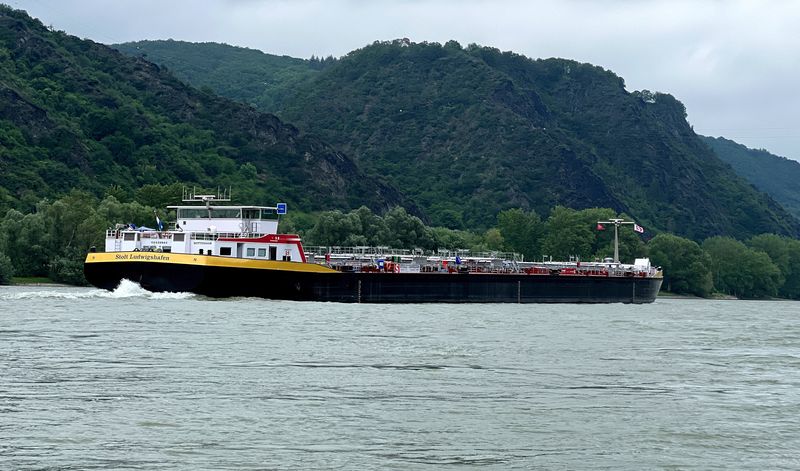By Christoph Steitz and Vincent Flasseur
FRANKFURT/LONDON (Reuters) - German industry is finding new ways to transport cargoes from coal to chemicals as increasingly frequent low water levels on the Rhine disrupt Europe's largest economy.
The 1,230 km (764.29 miles) river, a world famous tourist destination and a part of the national psyche, is the commercial artery for 80% of the German economy's inland shipping of goods, including crude oil and natural gas.
But following extended periods of low water in 2018 and 2022, Rhine levels are again too low in parts of the river for cargo vessels to sail fully loaded when they can hold the equivalent of up to 150 trucks.
At Kaub, the critical chokepoint for Rhine barges, water levels fell to their lowest this year earlier this week.
Last year, 182 million metric tonnes of goods were transported via Germany's waterways, down 6.4% from 2021 and the lowest since German reunification.
As severe heatwaves grip southern Europe, the Federal Waterways and Shipping Agency expects the downward trend to continue.
Germany chemical-maker Covestro transports more than 30% of its finished goods and receives the majority of the raw materials to produce them via the Rhine.
"Climate change and the increasing occurrence of low water levels are posing significant challenges to Covestro as well as other companies," Uwe Arndt, who heads Covestro's Rhine taskforce, said.
That is why the group has chartered two low-water barges that are able to supply customers with hydrochloric acid even when Rhine levels at Cologne fall to 0.40 metres.
Around 260 km down the river, BASF has also started to use a low-water ship to supply its Ludwigshafen hub, which gets around 40% of its raw materials via the Rhine.
In the case of inflammable and toxic chemicals, the river is often the only viable option for transport.
But Kaub levels below a metre mean that traditional barges must reduce their cargoes by more than half to under 1,500 metric tonnes, the DTG shipping cooperative says.
BASF's new low-water tanker - the Stolt Ludwigshafen - however can still carry a load of 2,300 tonnes and sail through the Kaub bottleneck at ultra-low levels of 30 centimetres (11.8 inches).
BASF Vice President Barbara Hoyer said the world's No.1 chemicals group depended on the Rhine as most liquid raw materials, including naphtha, are transported via the river.
"We need a lot to keep production going, and it's very difficult to move those volumes," she said.
Thyssenkrupp (ETR:TKAG), which declared force majeure during the 2018 dry spell because it no longer received enough raw materials, has chartered a train long-term that can supply around 3,000 metric tonnes of coal, needed to make steel, each day.
ARTERY OF THE ECONOMY
The impact of low water levels is not limited to big business. Germany's gross domestic product shrank by 0.4% in 2018 as Rhine traffic slowed.
As a rule of thumb, if water levels at Kaub fall below 78 centimetres for 30 straight days, as was the case in 2022 and 2018, industrial production falls by 1%, according to the Kiel Institute for the World Economy.
Deutsche Bank (ETR:DBKGn), which already expects Germany's economy to decrease by 0.3% in 2023, reckons that a prolonged period of low water levels could delay the country's recovery from recession.
DTG board member Roberto Spranzi, however, said demand for shipping has fallen in line with lower economic activity, meaning the impact of low water levels could be more manageable than in previous years.
WINNERS AND LOSERS
For industry, profit margins are squeezed by higher shipping rates and the cost of chartering low-water barges.
But logistics firms are benefiting from rising demand for vessels adapted to lower river levels.
"We expect, due to climate change, that the extremes on the river Rhine will happen more often," said Maickel Uijtewaal, general manager at Stolt-Nielsen.
The company is in talks with several customers with sites on or close to the Rhine about low-water barges, it said, adding firms were concerned about the integrity of their supply chains.
Germany's HGK Shipping, a unit of Cologne's municipal utility, is building three such ships for customers, including global grains merchant Archer-Daniels-Midland Co.
Its CEO Steffen Bauer said energy, chemicals and steel companies had limited alternatives for transporting large volumes of raw materials.

"There is a lack of capacity, infrastructure and personnel in the short- as well as mid-term for a like-for-like shift to rail and road," he said.
Chemicals firm Evonik, also a user of low-water boats, agreed saying Germany's railway system needed extensive upgrading, and that the leading industrial nation cannot rely on a second class railway network.